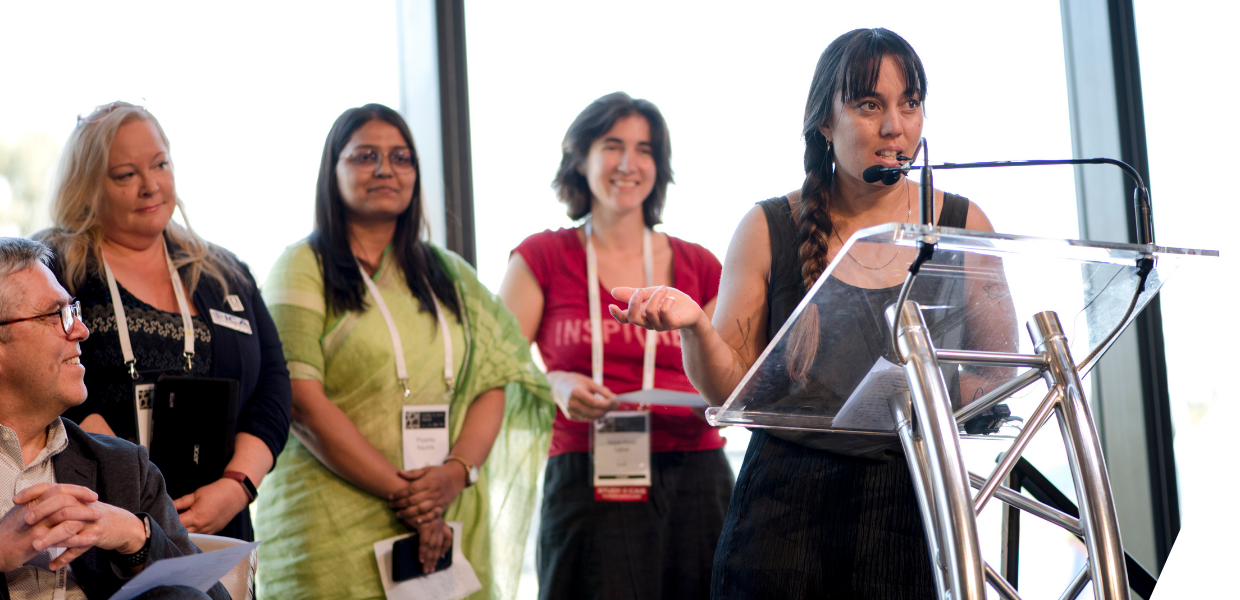Thank you for speaking to us today! Can you start by telling us about the International Council on Archives (ICA)?
Nicola: The ICA is the international professional association for recordkeepers and archivists. It offers support to the international community through training, networking, funding and learning opportunities.
What is your New Professionals Programme, and how does it work to build capacity within the archive profession?
Nicola: The New Professionals Programme is designed to support future leaders of the recordkeeping and archival profession. It brings six students/new professionals from across the world to work together for a year, gaining skills in teamwork, leadership, communications, presentation and project management. It also provides networking opportunities and supports the participants through a mentoring programme. It is through our future leaders, who represent different regions, language groups, cultures and communities, that we disseminate knowledge and build capacity in the archives profession.
What work and experience do participants gain? Does digital technology, practices or engagement play a role in this work?
Nicola: Those selected get to experience attending and presenting at an ICA conference or congress, presenting an International Archives Week webinar, running the New Professionals Programme social media accounts and newsletter and developing a project with outcomes that support the international new professionals community. Each year’s cohort works together with the ICA team and their mentors to come up with a project that is achievable, topical, and relevant to them, with digital technology and work practices often a priority.
Elisabeth: For example, in 2021 the new professionals cohort focused on a group project on how digitisation strategies can foster social inclusivity and facilitate memory and respect. We conducted a survey on this topic, which served as a starting point for a roundtable discussion at the ICA conference.
Francesca: We also had the opportunity to engage with the wider ICA network through conducting the survey and meet with key figures in the ICA.
What advice would you give someone just beginning their career in the cultural heritage sector?
Nicola: My advice is to participate in the community. People are always friendly and willing to share their knowledge, but you have to give something too to get the most benefits. Don’t be afraid to step up and have a go, everyone is really supportive.
Elisabeth: There are many opportunities to learn. The pandemic has increased the trend towards virtual workshops and conferences (see the Europeana events page). One can attend from anywhere, often even for free. Take advantage of these offers and always stay curious about topics you have never heard of before!
Francesca: Since starting my archive career, I have found this profession incredibly supportive. There are lots of learning opportunities and members of the community are always willing to share what to do, and also not what to do. Don’t be afraid to ask. Also value your previous experience, the cultural heritage sector can learn from you in the same way that you can learn from them.
What opportunities can new professionals take advantage of - and what challenges do they face?
Nicola: There are both opportunities and challenges for new professionals today and they differ globally. From my perspective in Australia, I think the biggest challenge is our job market for new professionals, where many have to take short-term, part-time contracts to gain employment in the sector. I would encourage anyone to make the most of the free resources that are made available across associations, including webinars, presentations, journals. If you can spend some money and join an association make sure you make the most of the benefits it offers such as applying for mentoring schemes, conference bursaries, and perhaps take on a role on a committee.
Francesca: Similarly, in the UK there are lots of seminars, talks and free resources that you can take advantage of. With the pandemic these are increasingly accessible online. A big challenge can be gaining the necessary qualifications to work in the sector, there are very few bursaries available and often new professionals have to work while taking their qualifications over a few years or have to take a year off to complete a postgraduate qualification.
What advice would you give to a cultural heritage institution or organisation that would like to involve and support students and new professionals in their work?
Nicola: Provide mentoring opportunities, support student placements, and host events where students and new professionals can meet your staff and learn from their expertise.
Elisabeth: Offer opportunities to write a thesis in collaboration with their own organisation or work together with student groups from universities to develop ideas or even practical solutions for their organisations.
Francesca: Work with new professionals on projects and give them opportunities within your organisation to gain new skills.
Do you have any plans for the European Year of Youth?
Nicola: The programme hopes to connect in with the European Year of Youth to reach new audiences, as our current cohort explores who are the new professional archival and recordkeeping community, and how they could feel more supported.
How can a student or new professional get involved in the ICA?
Nicola: Nicola: Students and new professionals are encouraged to follow our social media accounts on Facebook, Twitter and Instagram. Sign up to receive the New Professionals newsletter, and consider contributing to it, the ICA blog, or even putting in a paper for our next Conference. You can become a student member, or digital member, and join your regional branch or look into the Sections of the ICA. The ICA has much to give, and you have much to offer.
Francesca: As a new professional I know that we would have welcomed questions, or other new professionals reaching out to ask how to get involved. I’d say reach out to start a conversation.



